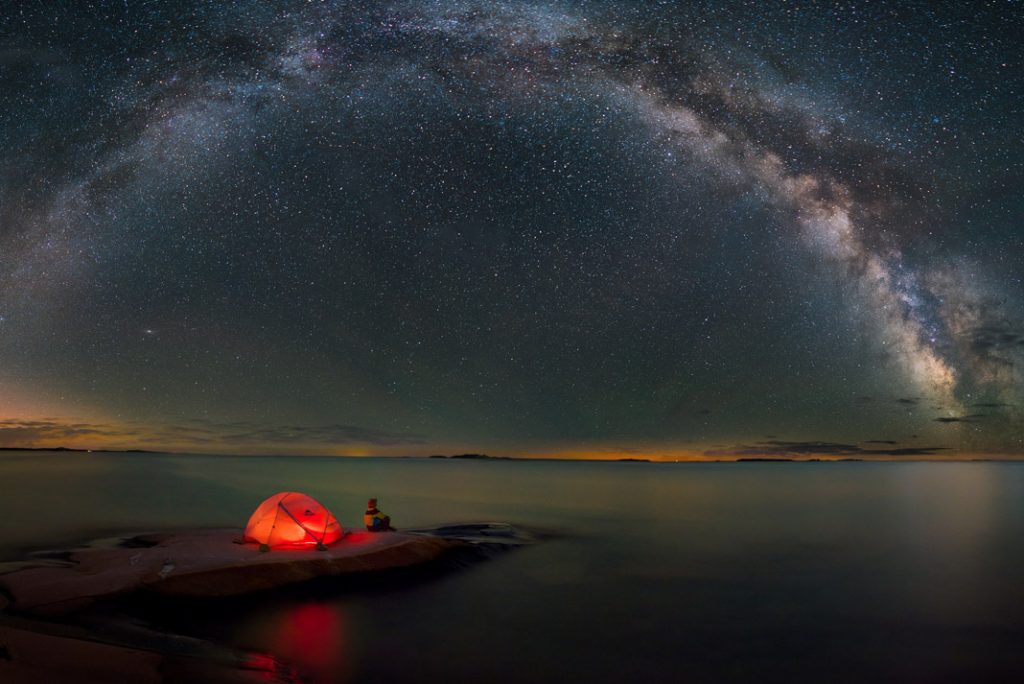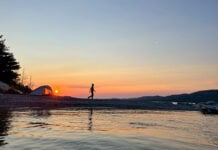On our last multi-day trip, my family’s search for a campsite exhibited some classic dysfunctional decision-making. It was late afternoon and it had just started raining. The kids were tired and wet. There was thunder in the distance and the storm was getting closer. However, we had a rest day coming up and wanted a good campsite for the next two nights.
Are We Picky About Our Campsites?
There was one campsite just ahead of us and two more around the corner nestled in a bay, a 20-minute paddle away. The previous year I had paddled by those bay sites and marked them with an asterisk on my map because they looked nice. The campsite in front of us didn’t look like anything special. I consulted my wife, Tory, who has the better mind for practical decision making, and she agreed we should paddle farther to the starred sites.

We arrived in the bay just as the storm hit. The first site did appear picturesque from the water, perched on a high point with red pines.
But when we unloaded and hauled our dripping selves ashore we were underwhelmed to find only weedy swimming and no flat tent sites. Truthfully, it was a pretty lousy site, with the wind blasting through the trees on the exposed point where we were now stuck, trying to shelter from the rain and lightning, huddling together to keep warm.
Surely, the next site will be better. When the storm eased we reloaded, motivated the kids, and paddled around the next corner—only to find the site occupied by a motorboat.
We reluctantly paddled back to the first site we’d passed an hour earlier, before the storm hit. This time I saw it with fresh perspective.
It was actually a beautiful flat spot with shelter from the prevailing winds, smooth rocks and deep, clear water for swimming. Plus, it had a spectacular view of the clearing skies and the mist-shrouded cliffs on the far shore.
I think we even saw rainbows.
When our two-week trip was complete, we remembered the nearly-overlooked site as our favorite—the one truly deserving of a star on the map. Of course, I didn’t appreciate it until I’d made sure there was nothing better around the corner.
Around the fire during that first night in camp, Tory and I discussed how we’d succumbed to a classic decision-making error, like a gambler or gameshow contestant driving themselves to ruin in search of a bigger jackpot.
What Will You Discover About Yourself and Your Campsite Selection?
Tory took it particularly hard because she’s proud of her ability to judge a campsite—or anything—on its merits rather than in comparison to some unattainable ideal.
I’m the idealist in the relationship. We are each the antidote to the other’s worst tendencies. I can grasp hold of a dream and urge her to hold out for better things, while she keeps me from endlessly searching for perfection. How the two of us ever settled on each other is a mystery; maybe it means she is perfect and I’m just good enough.
It reminded me of one of our first big arguments, which took place over a similar decision years ago on the streets of Paris. One dark and hungry evening we walked for hours in search of the perfect restaurant, me rejecting everything we passed because it didn’t match the candlelit boîte in my imagination. I was so sure we would find just the place around the next corner, so why settle.
Where we ended up wasn’t half bad, but its charms were soured by the heat of battle, with Tory angry about all the perfectly good places I’d rejected and me defensive because I’d failed to find a restaurant good enough to justify the long search.
On our camping trip, we brought along E. B. White’s classic Stuart Little to read to our son. Stuart Little is the story of a mouse born into an ordinary middle-class human family, which is super weird but just go with it. I realized Stuart Little and I have a lot in common in our dissatisfaction. Stuart runs away from his obtuse human family in search of adventure.
On his travels he meets Harriet Ames, who is a metaphor for the good things we tend to take for granted. She’s a beautiful, bright, well-dressed daughter of the wealthiest family in town. And she happens to be only two inches tall. And she agrees to go out with an itinerant mouse, no questions asked. What are the odds?
But Stuart is so obsessed with having the first date go just so—showing off his boatmanship in a toy birchbark canoe, no less—when his canoe is destroyed by vandals, he ditches Harriet and skips town in a huff to continue wandering, as if that’ll show ‘em to mess with his canoe. As if this mouse can find himself some other two-inch-tall rich girlfriend.
You stupid idiot, I want to yell, you’re running away from your best chance at happiness! Stuart concludes he’ll keep heading north to the end of his days. His odds of finding another beautiful and wealthy girl his size are slim. I like to think he comes back to Harriet Ames, once he realizes there’s nothing better out there.
Have I gotten wiser in my middle age, better at not playing Stuart Little when everything doesn’t go exactly as I’ve imagined, and just appreciating what the circumstances deliver? It’s a particularly good attitude to have in the outdoors, where I can’t often control the outcome and must adapt.
While I’d like to think otherwise, I’m not sure I have matured, because the campsite search played into my mindset perfectly.
Tory wished she’d saved time by recognizing the good campsite on the first try, but I loved it all the more for having confirmed there was nothing better around the corner. The fear of missing out on something great would have gnawed at me otherwise. If Tory had forced us to stop, because it seemed good enough or because it was raining, I could have spent two days resenting the spot instead of loving it.
It’s a testament to how satisfaction is based entirely on the framework with which we choose to view the circumstance.
Maybe this is just how humans are. We search for reassurance we’ve made the right choice, that we’ve arrived at the best place or thing. Why else endlessly scour TripAdvisor and Yelp reviews, hangrily walk the streets of Paris for hours, risk being caught out in a storm in search of a better square of dirt, and brood instead of accept and give thanks. We’re seeking an imaginary “right” choice—perfect or best—when often we’re presented with more-or-less equally worthy options, each with their own unique set of pros and cons.
The need to find validation is all in our heads.
To recognize when the place we end up is the place we want to be without having to waste time looking elsewhere for proof, well, that’s the wisest choice of all.









Love Tim Shuff. Hope that you continue to publish his writing. One of my favorites is “Age of Adventure”.